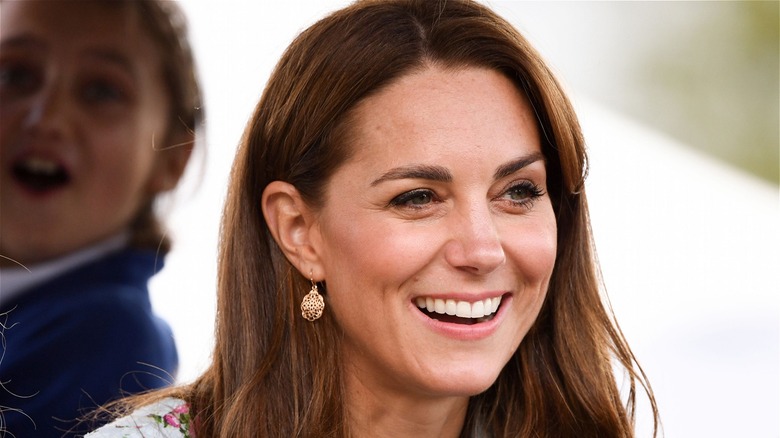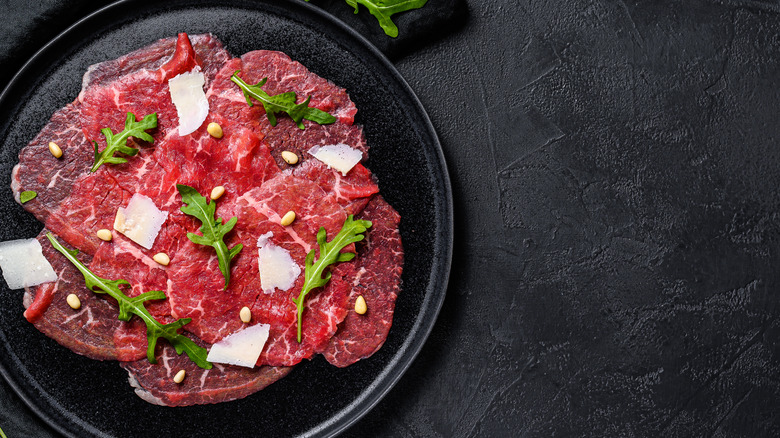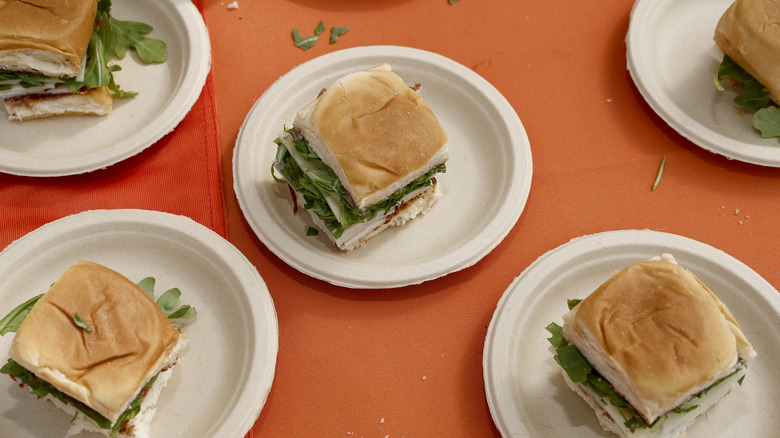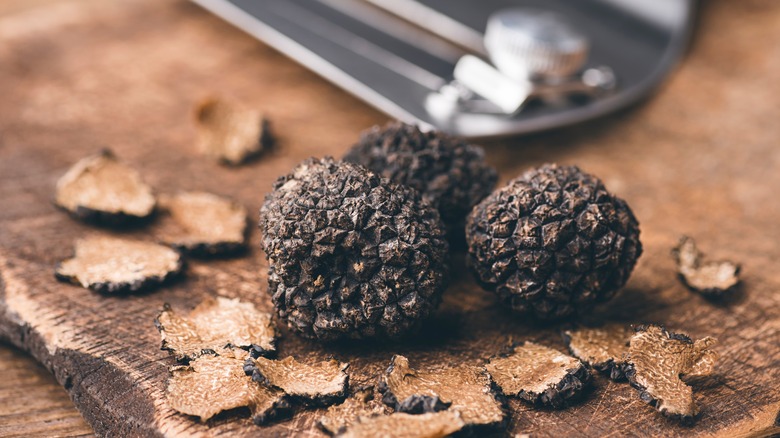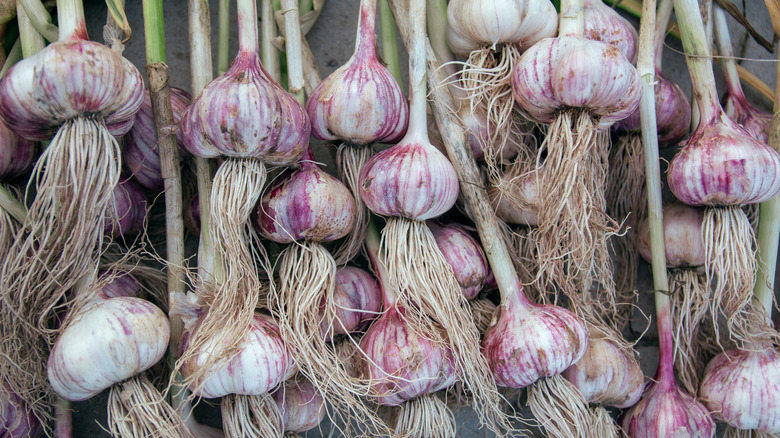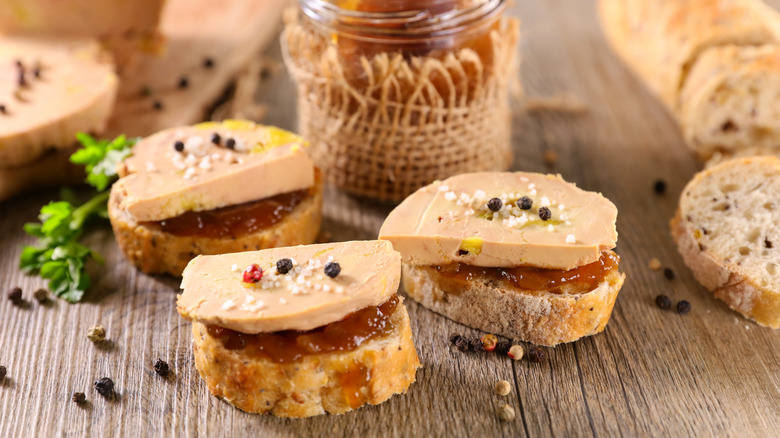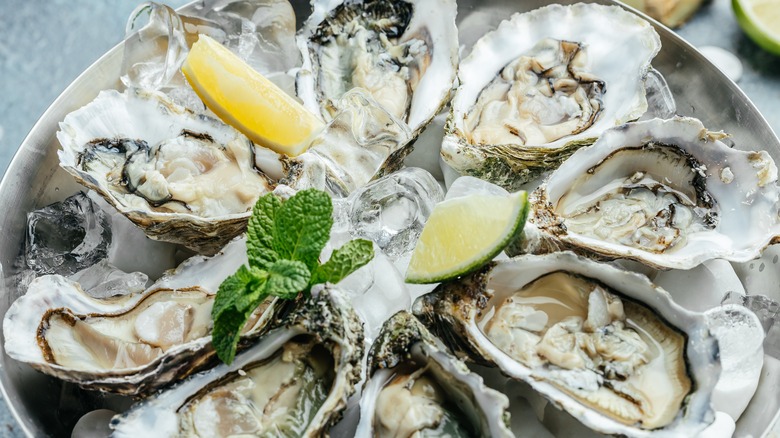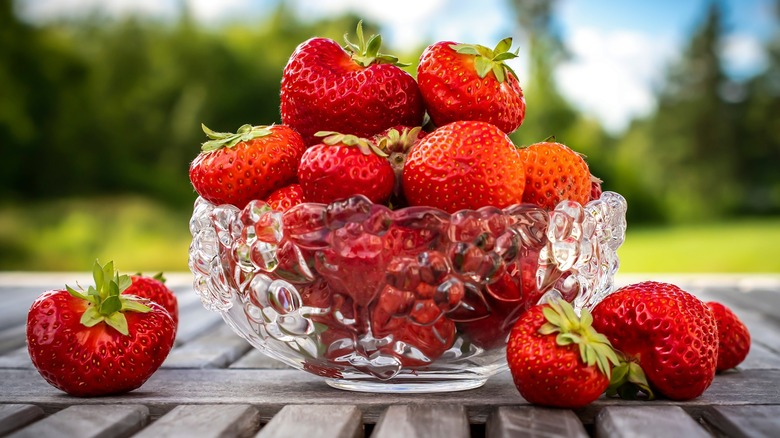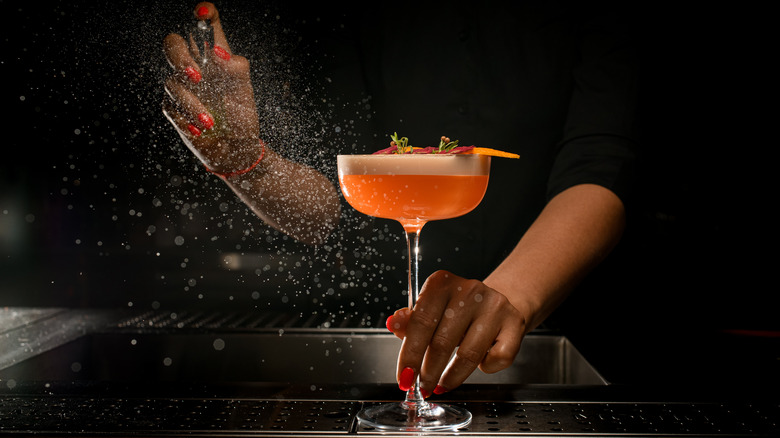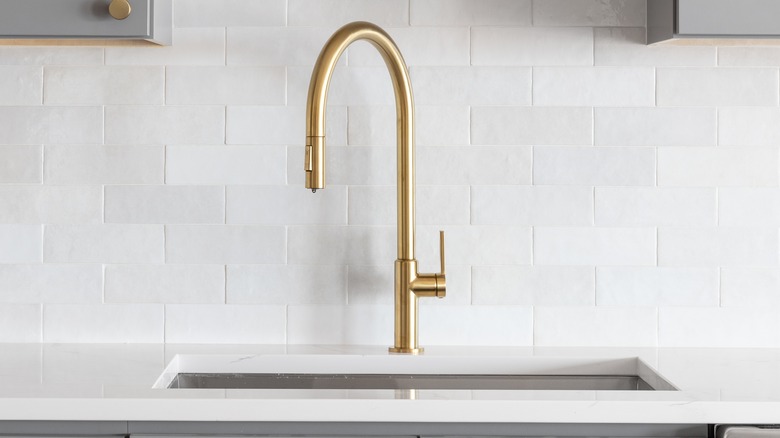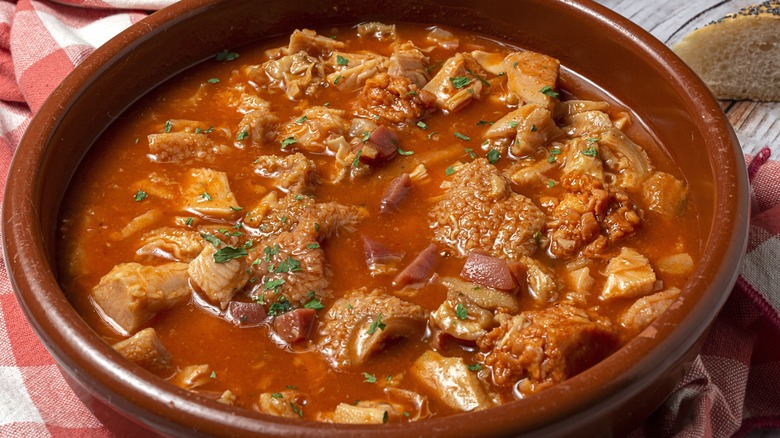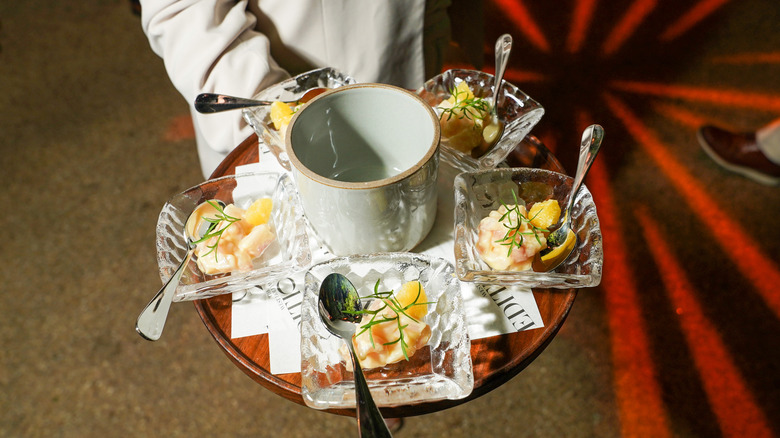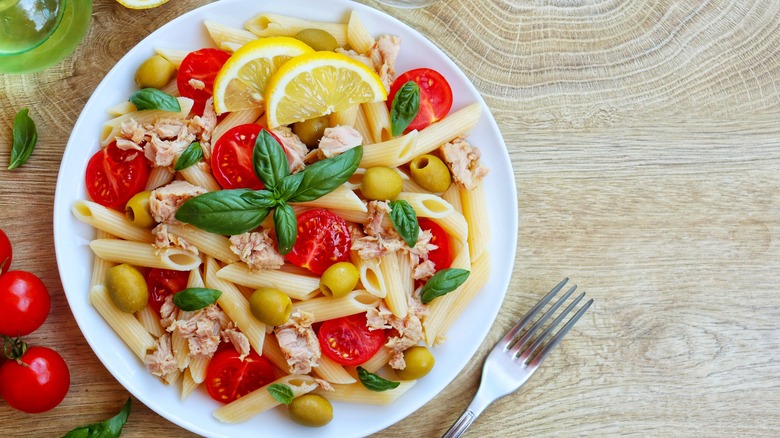Foods That The Royal Family Doesn't Eat
When you imagine a royal banquet, what dishes come to mind? Perhaps you conjure images of expensive seafood, like oysters topped with a dollop of caviar. Maybe you think of tables filled with delicacies such as beef tartare or squid ink pasta. What you might not guess is that these foods are off-limits for working royals.
Although the British royal family has deep pockets, its members are not allowed to indulge in all the best foods in the world. There are strict rules in the palace, monitoring which foods the royal family can — or can not — enjoy. The reason for this pertains to royal protocol — or a series of strict rules that calls for a certain level of propriety from anyone close to the crown. Senior members of the royal family, for example, are expected to hold their wine glasses by the stem and abstain from drinking before 6 p.m. During Queen Elizabeth II's lifetime, they were also encouraged to mimic the queen's eating habits and put down their forks whenever she stopped eating.
These rules also apply to which food items are acceptable. There is even a small list of delicacies forbidden on palace grounds. From raw meat to pasta, there are plenty of foods that the royal family avoids.
Rare or raw meats
There may be few things as delightful as a plate of beef carpaccio doused in fresh lime juice — or a rare filet mignon paired with a mushroom glaze. Unfortunately, however, Queen Elizabeth II banned members of the British royal family from enjoying these delicacies. According to former palace chef Darren McGrady, the queen always requested that beef be well-done. Speaking with The Sun, the royal chef shared: "We also couldn't serve meat that was rare, as she liked her meat more well done."
According to other sources, this rule likely comes from a desire to keep royal family members healthy. In an interview with Woman and Home, royal butler Grant Harold hinted that certain dishes often prone to food poisoning are avoided. After all, it wouldn't be particularly regal to show up to an official visit with any sort of dramatic tummy troubles.
The U.S. Food and Drug Administration reports that raw or undercooked meat can place consumers at risk for bacterial infections, like E. coli. If you ever want to opt out of a meal because the steak is cooked too raw, just say that you model your tastes after the queen.
Square sandwiches
The royal family is famous for its sandwich consumption. Queen Elizabeth II, in particular, is famous for her love of jam pennies: small butter and jam sandwiches shaped like the old English penny. However, Elizabeth's predilection for circular sandwiches isn't just a random preference; sandwiches cut into squares are actually banned from palace life due to their offensive connotation.
Former royal chef Graham Newbould revealed this in the documentary "Secrets of the Royal Kitchen" (via YouTube). Newbould said the royals perceive square sandwiches as a symbol of treason. Apparently, this history runs so deep that palace chefs have to trim these teatime snacks into the proper shape. "The royal family, when they're having square sandwiches, they always had the corners cut off. It's tradition. It goes back a long time. In the olden days, if you served anything to the monarch that had a point on it, it meant that you were trying to overthrow the throne," Newbould shared.
Because of this, you can often find the royal kitchen staff working hard on the family's teatime sandwiches. Recalling the time that he worked in the palace, former royal staffer Owen Hodgson told The Telegraph that he once got in trouble for not paying attention to his sandwiches. Apparently, Hodgson proceeded to "make the perfect tuna sandwich: cutting the loaf lengthways, buttering both sides ... He then folded over the two lengths, removed the crusts, and cut eight identical triangles. The palace kitchen was all about the details."
Fresh truffles
Queen Elizabeth II was known to enjoy fresh truffles. Nevertheless, she banned her kitchen staff from ordering more, effectively forbidding the entire royal family from enjoying truffles — at least while they were dining with the queen.
Chatting with The Telegraph, former palace chef Darren McGrady explained that finances had everything to do with the queen's odd rule: "The Queen loved scrambled eggs with smoked salmon and a grating of truffle. But she was too frugal to ever order fresh truffles." Per McGrady, Elizabeth would only indulge in truffles around the holidays. He told the outlet that she "really enjoyed them at Christmas when the truffles were sent as a gift."
Just because Elizabeth did not support year-long truffle indulgences, she did permit her family to enjoy other types of mushrooms year-round. The Telegraph reported that the queen and her family frequently ate steaks cooked in a mushroom whiskey cream sauce. Ex-palace staffer Owen Hodgson also told the outlet that he used to prepare mushrooms for the family, stating: "When we cooked the queen's mushrooms we always added a smidgen of marmite."
Garlic
British royals are expected to attend a whole lot of events. Because they represent the crown, working royals must do charity work, attend fundraisers, and sometimes even rub shoulders with celebrities. Of course, this means that they shake a lot of hands and chat with a lot of donors — a task that's best done with minty fresh breath. Because of this, Queen Elizabeth II banned garlic for royals at all events, excluding state banquets.
Interestingly, the new generation of royals seems keen on continuing this tradition. King Charles III is thought to respect his late mother's garlic rule, as he never really developed a taste for the ingredient.
In an interview with The Daily Express, chef Graham Tinsley opened up about his experience catering for the royal family. According to Tinsley, Charles tries to avoid a number of ingredients at dinnertime. These include chocolate, coffee, and garlic — all ingredients that can destroy your breath. Charles' wife confirmed this during an episode of "MasterChef Australia." Camilla Parker Bowles said garlic was the one food she wouldn't want to see at a royal reception, due to Charles' distaste for it (via Twitter).
Foie Gras
As a huge environmentalist, Charles has done a lot of work to fight global warming. Over the years, he has resisted the temptations of fast fashion and even started a sustainable fashion line to help combat the issue. The king's activism has even extended to the fight against animal cruelty, leading him to request the support of other royals — including the queen — to ban foie gras in the palace. This controversial food, made from duck or goose liver, is considered inhumane by some.
Ultimately, the king's campaign was successful. According to Andrew Farquharson, the household deputy master at Clarence House, Charles worked hard to rid the palace of foie gras. As Farquharson told the Daily Mail prior to Charles' ascension to the throne, "The Prince of Wales has a policy that his chefs should not buy foie gras." The staffer then went on to report that Charles considered canceling business with a shop that serves the delicacy: "His Royal Highness was not aware that the House of Cheese sells foie gras and this will be addressed when their warrant is reviewed."
Seafood
Crab legs or lobster risotto might sound like dishes fit for a king, but they are not always eaten by the royal family. Queen Elizabeth II was against the consumption of seafood, citing food poisoning as her major concern.
After all, canceled royal events due to alimentary intoxication could be humiliating to members of Britain's most famous family, since their lives are so widely publicized. As former royal butler Grant Harold explained in an interview with Woman and Home, "It is a very sensible move to abandon having seafood when out and about on public duties."
According to Harold, the stakes are particularly high when the royal family is traveling outside of the United Kingdom. When abroad, royals are often expected to sample local eats. Not only is it important to leave a good impression on a foreign country, but it's also essential to speak positively about the food on each visit. Because of this, it's best for working royals to skip anything that could make them feel ill. Declining to try a certain dish is way less embarrassing than having a publicly bad reaction to a regional delicacy. As Harold shared, "We don't want a member of the royal family having a serious reaction to food poisoning, especially if she is on an overseas tour."
Genetically-modified fruits
Queen Elizabeth II was a huge fan of strawberries. According to former royal chef Darren McGrady, the queen loved the berries grown at one of her estates. McGrady shared in a video on his personal YouTube channel that she particularly liked to use them to make homemade jams and jellies: "We make the jam at Balmoral Castle with the gorgeous Scottish strawberries from the gardens." However, just because the queen approved of her own home-grown berries, doesn't mean just any old fruit was allowed through palace gates.
In a separate interview with Recipes-Plus (via Delish), McGrady revealed that the queen banned out-of-season fruits from the palace. She especially forbade the purchase of genetically-modified berries — which are made to ripen at an unusual time of year. The chef shared, "You can send strawberries every day to the Queen during summer at Balmoral and she'll never say a word. Try including strawberries on the menu in January and she'll scrub out the line and say 'don't dare send me genetically modified strawberries'."
Alcohol served by strangers
Not accepting alcohol from strangers might not sound like a bad idea, no matter who you are. However, the British royal family takes this rule a step further. As observed by reporter Gordon Rayner — who went on upwards of 20 royal tours — King Charles III and his wife Camilla Parker-Bowles like to travel with their own booze in tow.
Apparently, this decision has everything to do with safety. Rayner told Condé Nast Traveler: "Prince Charles and the Duchess of Cornwall sometimes take their own alcohol so there's no danger of their drinks being spiked."
To ensure that nobody will tamper with their drinks, Charles and Camilla apparently ask their security team to step up. As Rayner explained, "Their police bodyguard will discreetly carry a bag of their drinks." For Charles, this means traveling with the ingredients to make a mean gin and tonic. In Camilla's case, meanwhile, it means voyaging with red wine.
Tap water abroad
Alcoholic beverages aren't the only kind of drink the royals avoid while traveling. Tap water is also largely considered off-limits. However, the royals' issue with tap water has less to do with the threat of a spiked beverage, than it does with food poisoning. As reported by The Sun, the royals try to avoid anything that could send them running to the "loo" in the middle of a day of busy engagements.
According to the Centers for Disease Control and Prevention, travelers have an elevated risk of contracting waterborne illnesses when traveling the world. To avoid this situation, the organization recommends avoiding tap water — even when you brush your teeth. It also suggests avoiding freshly-squeezed juices, ice, and fountain drinks. Meanwhile, they recommend enjoying beverages that you can open from a bottle or a can. Hot drinks, like tea or coffee, are also considered safe choices. Because of this, it's easy to imagine that senior royals make an effort to only drink pre-packaged beverages, and avoid water from the tap.
Simmered stock with chopped meat
On a cold winter's day, it wouldn't be unusual for some Brits to enjoy a warm bowl of rabbit stew. While there is clearly nothing wrong with this meal — it's been a popular dish for centuries — there is one reason that royals would likely not eat a plate of simmered stock and chopped meat today. This is because the dish is similar to what the palace kitchen prepares for the royal corgis.
According to former royal kitchen staffer Owen Hodgson, the cook would prepare a delectable meal of stewed meat for Queen Elizabeth II's beloved dogs. Hodsgon described the duty to The Telegraph, explaining: "I simmered rabbit, cooked down some chicken, then finely chopped the meat, sieved the stock and returned the meat [to the pot]." When asked if this was to prepare a terrine for Elizabeth, the royal cook replied, "No, it was the corgis' dog food."
Of course, it would be a little gross for any members of the royal family to be caught indulging in corgi treats — no matter how fancy. Because of this, it is extremely likely that you'll find them eating a simmered stock filled with chopped meat.
Large hors-d'oeuvres
There may be nothing that seems as chic as some hors-d'oeuvres served with champagne. However, there is one thing that can prevent a delicious appetizer from looking elegant in your hand: its size. According to a report by The Sydney Morning Herald, the British royal family likely understands this. Professional high-class caterer Matthew Haigh told the outlet that chefs understand that the upper echelon doesn't like large hors-d'oeuvres: "We always design menus for our clients who host cocktail events to avoid foods that take more than two bites, that are overly constructed, for example, piled high like Mount Everest and risk collapsing, and that are laden with sauces."
Because of this societal rule, the British royal family probably avoids eating large appetizers. After all, it's difficult to look elegant while attempting to cram a palm-sized sandwich into one's mouth. As per Reader's Digest, the royal kitchen seems to follow this rule, often trying to serve food in small pieces. Ex-palace chef Darren McGrady told the outlet that he used to prepare "one-inch eyes of lamb meat" for the royals. Apparently, though, Prince Philip would break the family's small servings rule, even offering to trade dinner with the staff to get his hands on a larger hunk of meat.
Starches like pasta or potatoes
Queen Elizabeth II was known to enjoy pasta and potatoes at state banquets. However, these starches were banned from the palace during normal times. As Elizabeth's chef Darren McGrady told The Telegraph, the monarch avoided these ingredients in order to keep fit. McGrady explained, "When she dines on her own, she's very disciplined. No starch is the rule. No potatoes, rice, or pasta for dinner. Just usually something like grilled sole with vegetables and salad."
While it may have been easy for Elizabeth to follow this forbidden food rule, not all royal family members managed to do the same. Prince George is reportedly a major pasta fan. Spaghetti carbonara is sometimes a part of what Prince George typically eats in a day, as the dish is reportedly the young royal's favorite food. Of course, it's understood that George's young age likely made him an exception to Elizabeth's dining rule, as a big plate of pasta sounds like a satisfying dish for a young prince.
